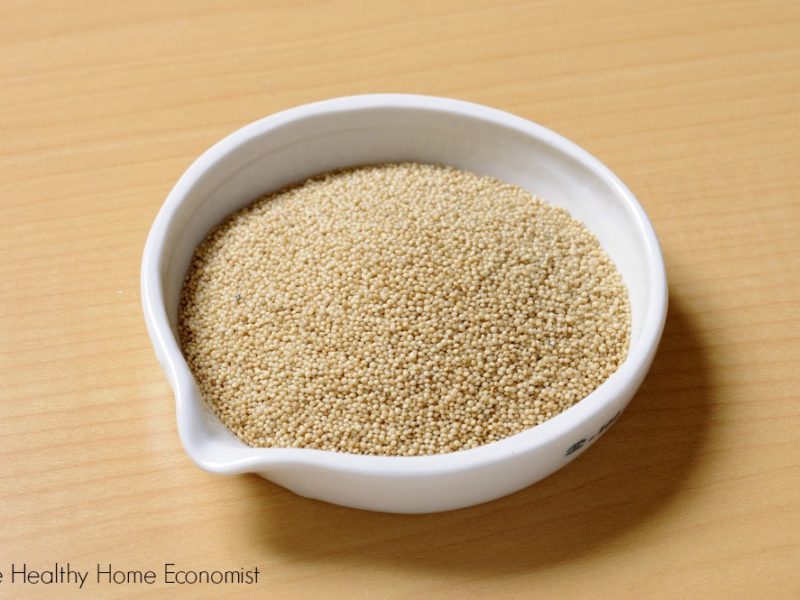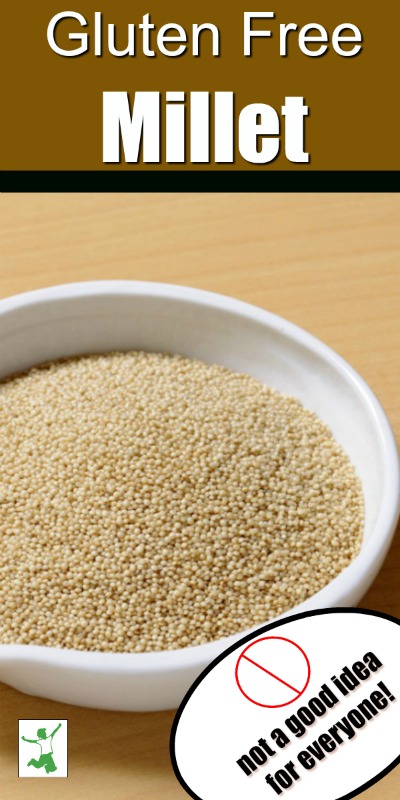Examination of why millet should optimally be eaten in moderation as a gluten-free whole grain in order to avoid disrupting hormone health.

Gluten allergies are clearly on the increase in our modern society. It seems like practically every other person I know these days has some sort of digestive issue that avoiding gluten would probably improve.
At the top of the list of gluten-containing foods is wheat. It is the indisputable, primary staple of the Western diet. Wheat is also the very foundation of the controversial USDA Food Pyramid.
Given how important bread and other wheat-based carbohydrates are to our society’s basic food requirements, it’s no wonder that folks seek a quick and easy substitute for wheat bread and wheat-based snacks when a gluten allergy or Celiac disease has been diagnosed.
Millet: Ancient Gluten-free Whole Grain
Enter millet. This ancient grain was cultivated in East Asia as far back as 10,000 years ago, according to archaeologists. Surprisingly, the cultivation of millet in prehistoric times was more prevalent than even rice, particularly in what is now China and the Korean peninsula.
Millet’s resistance to drought is perhaps the reason for its popularity in ancient times and its spread to Europe by 5000 B.C.
Despite the 5000 years cultivating this whole grain as a staple food, millet porridge is considered a traditional food in Russia as well as China. Use of millet is also widespread in Africa, like gluten-free teff, likely due to the drought-prone climate.
Millet Bread: Logical Substitute for Wheat
The protein structure of millet is quite similar to wheat. The one glaring exception is that millet is a gluten-free grain. Wheat contains copious amounts of this hard to digest plant protein.
When plain millet flour is used for baking bread (as opposed to homemade gluten-free flour or a healthy gluten-free flour mix from the store), the resulting loaf is light, white, and quite similar in texture to wheat bread. As a result, people who wish to avoid gluten tend to immediately gravitate to millet bread as the most logical and palatable substitute.
Millet bread is extremely popular in health food stores. Sami’s Bakery and Deland Bakery are two local bakeries that sell an absolute ton of millet bread to these stores around my local metro area.
I recently corresponded with a person up the East Coast of the USA who was consuming a lot of the millet/flax chips as an alternative to wheat-based snacks and had no idea of the potential health risks from consuming so much millet.
It was this discussion that led me to write this blog and warn folks about the dangers of consuming too much millet!
Potent Goitrogens
While millet does not contain gluten, it does contain goitrogens. These are substances that suppress thyroid activity and can lead to goiter. This condition involves enlargement of this very important gland which resides in the throat. Low iodine intake can also lead to goiter for those who rely on millet as a staple according to the Journal of Endocrinology and Metabolism.
Hypothyroidism is a serious and sometimes debilitating condition. It accompanies a weak or enlarged thyroid such as what occurs with goiter. Depression, difficulty losing weight, loss of hair, cold hands/feet, and fatigue are common hypothyroid symptoms. By some estimates, hypothyroidism is at epidemic proportions in Western society. (1)
Goitrogens in foods that contain them are usually reduced by cooking such as cruciferous vegetables like broccoli. However, cooking actually increases the goitrogenic effect of millet! Incidentally, the same effect occurs when fermenting soy.
Therefore, when folks begin eating large amounts of millet bread with a wholesale switch over from wheat, the thyroid suppressing effects of this simple dietary change can be profound. Injuring the thyroid can have a cascade effect on other glands as well. For example, those suffering from adrenal fatigue many times have thyroid issues as well.
Moderation is Critical
Protect your thyroid at all costs! It is a real challenge to unwind the effects of hypothyroidism once this vital gland is weakened or enlarged. Don’t take any chances with your thyroid health by consuming large amounts of millet bread or millet based snacks.
If gluten and/or wheat is a problem, then simply reduce bread consumption. Alternatively, use another grain that is both gluten-free and non-goitrogenic such as rice, oats or teff. Be sure to get quality, though, as rice is frequently high in arsenic.
Alternatively, try using grain-like gluten-free foods such as highly nutritious buckwheat, amaranth, or the starchy tuber cassava. They are excellent for baking too!
Millet bread consumption is fine in moderation if your thyroid is healthy – just don’t overdo it!
Given how difficult it is in modern society to maintain thyroid and overall glandular health, taking a chance by eating a lot of millet bread is a risky proposition indeed.
Traditional peoples did not have the constant stresses and strains on their glands like modern people do.
For example, they did not have to contend with pollution of their food, water, air and overall environment.
Therefore, we must be overprotective of our thyroid health. This includes avoiding regular consumption of foods that might impair it in any way.

Millet Alternatives That Preserve Thyroid Function
If you have thyroid issues and need alternatives to millet, here is a list of the healthiest options to consider.
- Einkorn Benefits (contains “good gluten“)
- Teff Benefits
- Yuca Root Benefits
- Arrowroot Benefits
- Wild Rice Benefits
- Farro (great if only modern wheat is the problem)








Miller’s are good healthy food. I’m consuming these Miller’s for last 7 years and I’m doing good. No health issues. We Indians eat lot of Miller’s. All the food like chicken, mutton eggs….. R poisonous food.
What millet is a risky factor for goiter. We in india consume foxtail, little millet, barnyard, browntop and kodo millets as healrhy diet option. I have seen people consuming these for 20 years without thyroid issues? So, what is the millet that you are mentioning which troubles the thyroid? Please share that article
I have linked to the scientific evidence that millet is a goitrogenic food. The problem seems to affect Westerners more than other cultural groups.
I’m about to start an elimination diet due to our 9 mo reacting to many foods in my milk and in general. Recommended hypoallergenic foods are lamb, pears, squash and millet. Would you recommend skipping the millet? And would I be best to delay millet in his diet until a year as we’re doing with grains? Thanks!
Grains including millet are totally inappropriate food for a 9 month old baby! Soaked millet porridge would be fine after 1 year.
Does this include oatmeal? I have recently begun eating GF soaked raw oatmeal as a cereal.
Couple of things … first of all, oats are never really gluten free even if labeled that way and processed in a GF facility. https://www.thehealthyhomeeconomist.com/gluten-free-oats/
Secondly, you should never eat grains raw even if soaked. They must ALWAYS be cooked. The cooking completes the deactivation process of the anti-nutrients.
Eating oats soaked but not cooked is a grave risk to digestive health. NO traditional cultures that ate oats as a staple ate them raw.
That said, oats are not a risk to thyroid health like millet can be.
I was told by a health professional to consume Brown millet every day for my hair and nails. I have thyroid problems and am on medications. Is there another grain I could consume that would give me the same benefit without comprising my thyroid?
Collagen hydrolysate is amazing for hair and nails with no thyroid downside. https://www.thehealthyhomeeconomist.com/hydrolyzed-collagen-uses-and-benefits/
What gluten free options do i have other thsn Millet for a person with an ubderfunctioning thyroid?
There are so many gluten free options that don’t risk the thyroid! Here is an article that covers them in detail. https://www.thehealthyhomeeconomist.com/how-to-mix-and-use-gluten-free-flour/
Can millet flour be used in a smoothie without cooking.
Using any grain flour including millet without cooking it is VERY dangerous and damaging for the intestinal tract.
Gluten contamination is not the only thing that can cause autoimmune destructionn of intestinal mucosa in celiac patients eating oats.
I learned about Avenin (the protein in oats) in the 1980’s. In a subset of celiac patients, it triggers the same autoimmune reactions as gluten. I ate oats every morning as a prevention for diarrhea, and because, working 60-120 hours per week as a medical resident, I didn’t have time for exercise or a super healthy diet. After I learned about Avedin, I stopped eating oats and became constipated despite eating lots of fresh vegetables. I had to add in beans 3 times per day, and soluble fiber. Oats caused more diarrhea for me than wheat. I strongly recommend people with HLA subtype or biopsy verified celiac disease avoid oats because there is no way to reliably ascertain that you are NOT in the subset of Celiac patients that has an autoimmune reaction to oats.
https://www.ncbi.nlm.nih.gov/pmc/articles/PMC5478399/
Millet is a broad term. Which millet are you specifically talking about here ? We consume foxtail, barnyard, Brown top, little and Kodo millets . Should we be concerned ? Please advise.
All types of millet are goitrogenic. Eating it in moderation and properly prepared is fine for most people. Just don’t overdo and if you already have thyroid disease, best to avoid all millet.
Is this article based on any studies? Because many Indians eat millets daily and babies are fed ragi (finger millet) and considered very nutritious. I have not seen/heard any babies having issues but definitely have heard positive things. Any links to studies is greatly appreciated especially related to thyroid. Thanks in advance!!
Millet is a known goitrogenic food. https://www.ncbi.nlm.nih.gov/pubmed/2921306
That said, millet is a healthy food consumed by healthy cultures. For Westerners who seem to have more delicate thyroids and consume excessive grains in the diet, caution and moderation is best with millet. It doesn’t mean you should never eat it, just be careful not to overdo and if you already have thyroid disease, best to eat another gluten free grain.